Vision Prize: scientists are worried the IPCC is underestimating sea level rise
The survey results also show the change in the IPCC estimated climate sensitivity range is not at all reassuring. The Vision Prize is an online survey of scientists about climate risk. It’s an impartial and independent research platform for incentivized polling of experts on important scientific issues that are relevant to policymakers. Some of their previous survey results have found that about 90 percent of participating scientists believe that humans are the primary cause of global warming over the past 250 years.

Graph by Stefan Rahmstorf comparing measured sea level rise (red and blue) to previous IPCC estimates (grey and dashed lines), showing sea level rise is happening faster than expected.
In its latest survey, the Vision Prize asked participants questions about technologies to limit climate change, and about the latest IPCC report. Two of these questions asked about the likelihood that global average sea level will rise less than the IPCC lowest estimate (0.25 meters, or 10 inches), or more than the IPCC highest estimate (0.91 meters, or 3 feet) by 2100. These estimates are about 60 percent higher than in the 2007 IPCC report, which intentionally left out dynamic processes that cause effects like the calving of ice shelves into the ocean, because at the time they were not well understood. As expected, research has shown that the previous IPCC report underestimated the rate of sea level rise.
The Vision Prize results revealed that despite the much higher sea level rise estimates this time around, the survey participants are worried that the IPCC is still underestimating future sea level rise. 41 percent responded that it’s likely or very likely that sea level rise will exceed the IPCC highest estimate, and 71 percent answering that it’s at least as likely as not. Conversely, only 5 percent responded that it’s likely sea level rise will be less than the IPCC lowest estimate, and 83 percent called this scenario unlikely.

On the other hand, if greenhouse gas emissions are reduced strongly, the experts expected sea level rise to be between 0.4 and 0.6 meters by 2100. These results suggest that the Vision Prize participants may be pessimistic that we’ll transition away from a business-as-usual emissions path.
Another Vision Prize question asked about the IPCC estimate of the planet’s sensitivity to the increased greenhouse effect. The latest IPCC report estimated that the planet will eventually warm between 1.5 and 4.5°C in response to the increased greenhouse effect if the amount of carbon dioxide in the atmosphere doubles. The 2007 IPCC report put the estimate at 2 to 4.5°C, but the three IPCC reports before that and the 1979 Charney Report had all estimated a 1.5 to 4.5°C climate sensitivity.
In the Wall Street Journal, climate contrarian Matt Ridley claimed that the change from the 2007 report to the latest version,
“…points to the very real possibility that, over the next several generations, the overall effect of climate change will be positive for humankind and the planet.”
Vision Prize participants were asked whether they agreed with this interpretation of the revised IPCC estimate. 72 percent strongly disagreed, 87 percent disagreed, and only 9 percent agreed with Ridley’s interpretation. Although the lower end of the estimated climate sensitivity range decreased back to a value consistent with expert estimates made between 1979 and 2007, this in no way suggests that climate change might be beneficial.
In terms of climate solutions, the latest Vision Prize poll reveals that carbon capture and storage is not thought likely to have a short-term impact. Just 16 percent of those surveyed believe the technology will measurably affect the global climate by 2050, and only 4 percent would choose this approach as a top priority for large private investment attempting to avoid dangerous levels of global warming. When it came to this type of spending, distributed renewables were the most popular choice, closely followed by energy efficiency. In third place was next-generation nuclear power.

The majority of Vision Prize participants are academics with expertise relevant to climate science.

For more from the poll, including views on the chances of atmospheric carbon dioxide concentrations reaching double pre-industrial levels by 2100, see the Vision Prize website.
Overall these results indicate that scientists are pessimistic that we’ll take sufficient steps to avoid dangerous levels of global warming and sea level rise. They don’t agree with the unjustifiably optimistic view of Matt Ridley and his fellow climate contrarians. They also appear to believe that deploying existing low-emissions technologies should be a top priority in mitigating the threats posed by human-caused climate change.
Fonte: theguardian.com



